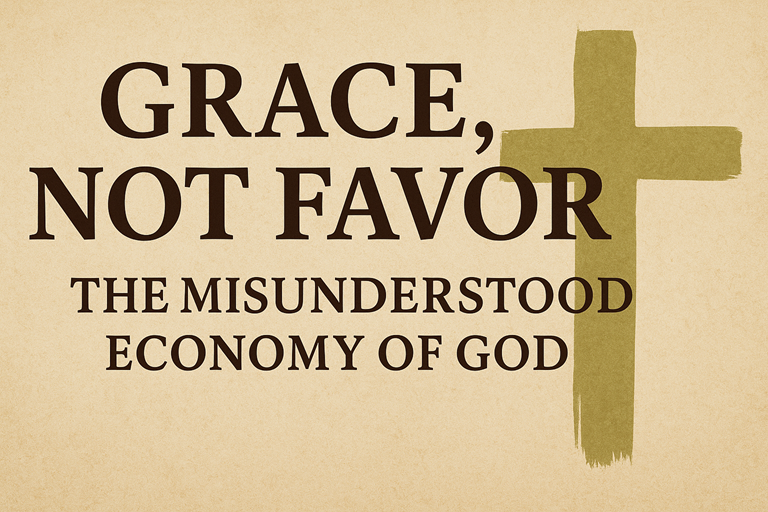One of the deepest misunderstandings among Christians today is the belief that the Christian life is a transaction with God: if we are good, faithful, or sacrificial enough, God will reward us with health, prosperity, or protection. In other words, we imagine we live under God’s favor. Yet the New Testament insists on something radically different: we live under grace.
The Old Covenant: Favor Based on Obedience
In the Old Testament, God related to Israel through covenants that often linked blessing to obedience.
- In Deuteronomy 28:1–2, God promises:
“If you fully obey the Lord your God and carefully follow all his commands… all these blessings will come on you and accompany you.” - Conversely, disobedience would bring curses (Deuteronomy 28:15).
This was the favor economy: obedience brought favor, disobedience brought judgment. It set Israel apart as God’s chosen people, but it also exposed their inability to keep the law perfectly.
The New Covenant: Grace Through Christ
With Jesus Christ came a profound shift. God’s relationship with humanity was no longer based on conditional favor, but unconditional grace.
- Paul declares in Romans 6:14:
“For sin shall no longer be your master, because you are not under the law, but under grace.” - In Ephesians 2:8–9, he emphasizes:
“For it is by grace you have been saved, through faith… not by works, so that no one can boast.”
Grace is not a reward for obedience; it is a gift given freely in Christ. This is the “new economy” of salvation: not merit, but mercy.
Grace vs. Favor: Clearing the Confusion
The problem arises when Christians confuse grace with favor. Favor suggests God is still dealing with us in terms of performance: that if we pray more, give more, or behave better, we will earn His blessings.
But grace says the opposite:
- We cannot earn God’s blessings.
- We already have every spiritual blessing in Christ (Ephesians 1:3).
- Our relationship with God is not a contract but a gift.
To live under favor-thinking is to slip back into the Old Covenant, expecting earthly rewards for spiritual obedience. To live under grace is to rest in Christ’s finished work, trusting that salvation and peace with God are secure — even when life is hard.
The Witness of the Apostles
The apostles themselves did not live charmed lives of “favor.” They suffered, were persecuted, and most died brutally.
- Paul catalogues his sufferings in 2 Corinthians 11:23–27 — imprisonments, beatings, hunger, shipwrecks.
- Peter was crucified upside down, James executed, John exiled.
If favor were the measure, their lives looked like failure. Yet they understood grace: that in weakness, God’s power is made perfect (2 Corinthians 12:9).
Jesus Himself: No Favor, Only Grace
Even Jesus was mocked for not delivering Himself from the cross:
“He saved others; he cannot save himself” (Matthew 27:42).
If God’s favor meant protection from suffering, then Christ would never have gone to Calvary. Instead, the cross revealed grace — God’s unmerited love poured out through suffering, not apart from it.
Living Under Grace Today
This is the heart of the Christian life: we do not live in a “queue-and-take economy” with God. He is not a mafia boss offering protection for payment. Instead, we live in the mystery of grace: unearned, unconditional, unbreakable.
Bad things still happen to good people. Good things still happen to bad people. But in Christ we have something greater than favor — the assurance that nothing can separate us from the love of God (Romans 8:38–39).
Conclusion: From Transaction to Transformation
The shift from favor to grace is the shift from religion as transaction to faith as transformation. Favor seeks blessings as payment for devotion. Grace offers salvation as a gift, freely given through Christ.
This is the freedom of the gospel: that God is not running a protection racket, but opening the door to eternal life, secured by grace and grace alone.
_____________________________________
✝️ Key Scriptures to Reflect On:
- Deuteronomy 28 (favor through obedience)
- Romans 6:14 (under grace, not law)
- Ephesians 2:8–9 (salvation by grace)
- 2 Corinthians 12:9 (power in weakness)
- Romans 8:38–39 (inseparable love of God)













